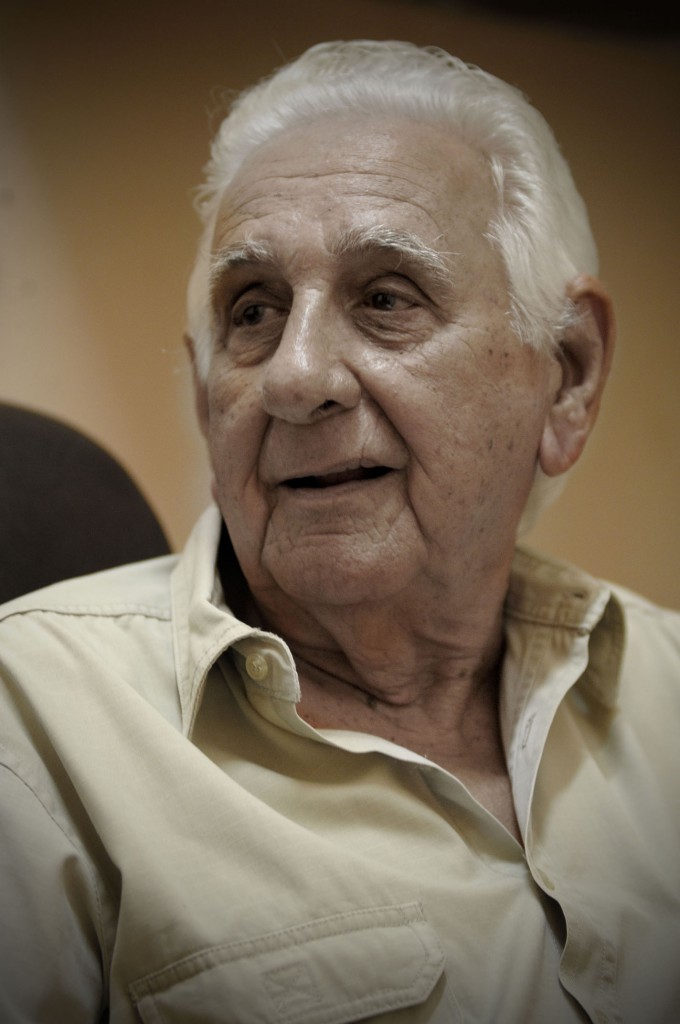By Claudia Zurita Delgado, student of Journalism
Alberto Luberta is one of those grandfathers we would like to have. His voice is gentle and his eyes bright when he talks about his job. He wakes up at 5:00 A.M. every day to start working, because he writes the scripts every day. He is always ready for interviews and talk about stories. He decided to mix these two things and tell us a little bit about his life and opinions in relation to the 8th Congress of the National Association of Cuban Writers and Artists (UNEAC), which will be held from April 11 to 13 where he will participate as delegate.
How important can this congress be for artists of the Cuban Radio?
The congress must be good for the Cuban Culture in general. We could have a pretty fruitful dialogue. We will debate in sessions the implementation of Resolution 51 about the payment of writers. This is a very important issue, because many writers leave this media due to the low wages. It is also important to talk about the artistic education. It is not much taught in schools, or sometimes there is nothing taught of Radio media. This could help stimulate this vocation in adolescents and Young people for this media. So we should find alternatives, as it is done in Radio Progreso, where we have Studio 5 turned into classroom. Groups from the Faculty of Art and audiovisual Communication Media come twice a week and receive classes from writers Caridad Martinez and Orieta Cordeiro. This idea supports the link students-radio station, and they have more information of how it works.
How did you get to the Radio?
I graduated as typist. It was then called copyist. When I finished Junior High in 1947, CMQ (as it was named before 1959, it is nowadays ICRT-Cuban Radio and Television Institute) hired me and from that moment on, my life was different: the radio gave a sense to my life. I worked there for 15 years and I even reached the post as head of typing. By then, the direct contact with the best writers from the radio aroused the interest in writing.
From copyist to writer of Alegrias de Sobremesa Program
When I was a copyist the first thing I did was for Alma de las cosas. I had already heard some emissions and a dared to write two scripts. The principal scriptwriter liked them and I kept on doing them. I then turned into what many people call phantom writer. Later came April 9 strike in 1958 and I had to leave the country. In Venezuela, during my exile, I also worked in several radio stations. When the Cuban Revolution triumphed I could returned. On April 1961, Antonio Suarez used to write Fiesta a las 9, and offered me to make the sketch of an interval segment called Tota y Pepe. I became humorist then. Alegrias de sobremesa comes by chance. Once, I met Antonio Hernandez, director of Radio Progreso and he talked to me about that program then. I remember he wanted me to design him some scripts because audience ratings were low. I accepted and see where I am today. On April 15 I will celebrate 49 years here.
Alegrias de Sobremesa: How much is in Alegria about you and vice versa?
When you write, you fill the work with your way of thinking, with your problems, your dreams. The program is not alien to this phenomenon. Paco, one of my characters is the one most alike me. My wife always said I placed all my ailments. From Alegria I take the people, we learn a lot from all of them. Our team is very close, inside and outside work.
In your opinion, what is the key of the success in this program?
If you ask many people, they will say it is the script for sure, or the actors. The truth is that these two elements are very important. But the characters are what really make it successful. Through them I get into their homes. My characters are another neighbor for them. This way, they see their daily life and identify with them. That is why they tune us every day.
You were retired and then came back again. Why?
Yes, in 2007 I decided to retire. I thought I could give the chance to the new generations, and I left Ahmed Otero in my post. However, he did not manage to do the job. He did not hand in the scripts on time and due to some changes, we lost audience. Many people asked me to come back, and I did it. On September 2011 I started again to write.
For you, how is the radio nowadays?
Despite everything, the radio is going on and in my opinion is above the level of the television. However, we have problems. There is repetition of the voices either actors and actresses or broadcasters. Voices were exclusive of a radio station before, but now, due to the economical situation, many have several jobs in different radio stations. We should also attract young people too, catch them. Many of them are like me; they just need the incentive.



